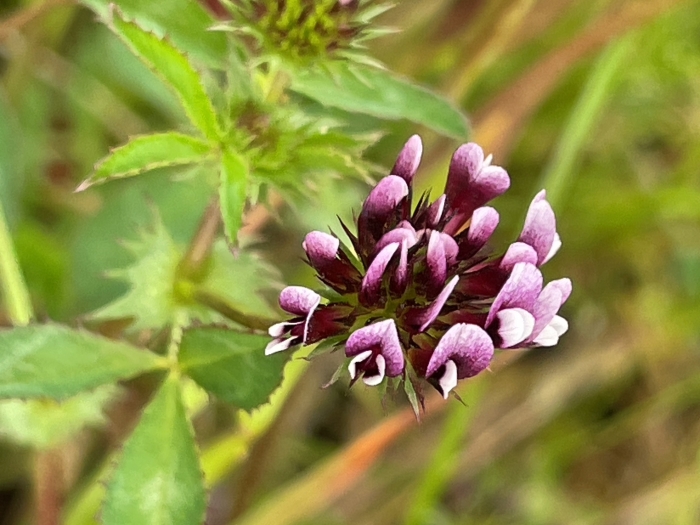Whitetip Clover
(Trifolium variegatum)
Whitetip Clover (Trifolium variegatum)
/
/

joqatana
CC BY 4.0
Image By:
joqatana
Recorded By:
Copyright:
CC BY 4.0
Copyright Notice:
Photo by: joqatana | License Type: CC BY 4.0 | License URL: http://creativecommons.org/licenses/by/4.0/ | Rights Holder: joqatana | Publisher: iNaturalist | Date Created: 2023-05-03T21:40:46Z |























Estimated Native Range
Summary
Trifolium variegatum, commonly known as Whitetip Clover, is a versatile plant that can be either an annual or perennial herb, depending on environmental conditions. It is native to a variety of habitats in western North America, including grasslands, meadows, open woodlands, and forest clearings, from southern Alaska and British Columbia to Baja California. The plant typically grows in a prostrate to upright form and reaches a modest size. It is characterized by its trifoliate leaves, each leaflet with serrated edges, and a headlike inflorescence of small, pea-like flowers that are purplish with distinctive white tips, blooming from late spring to early summer. The flowers are modest in size but can add a subtle charm to the garden setting.
Whitetip Clover is valued for its adaptability to various soil types, including dry, sandy soils and moist meadows. It is often found in disturbed areas, suggesting a certain resilience and ease of cultivation. This clover is used for ground cover, erosion control, and as a component in wildflower mixes for naturalized areas. It thrives in full sun to partial shade and prefers well-drained soils but can tolerate a range of moisture conditions. While not commonly used for culinary or medicinal purposes, it can contribute to soil health by fixing nitrogen. Potential problems include susceptibility to rust and mildew in overly moist conditions.CC BY-SA 4.0
Whitetip Clover is valued for its adaptability to various soil types, including dry, sandy soils and moist meadows. It is often found in disturbed areas, suggesting a certain resilience and ease of cultivation. This clover is used for ground cover, erosion control, and as a component in wildflower mixes for naturalized areas. It thrives in full sun to partial shade and prefers well-drained soils but can tolerate a range of moisture conditions. While not commonly used for culinary or medicinal purposes, it can contribute to soil health by fixing nitrogen. Potential problems include susceptibility to rust and mildew in overly moist conditions.CC BY-SA 4.0
Plant Description
- Plant Type: Herb
- Height: 0.5-1 feet
- Width: 0.5-1 feet
- Growth Rate: Rapid
- Flower Color: White, Pink
- Flowering Season: Spring, Summer
- Leaf Retention:
Growth Requirements
- Sun: Full Sun, Part Shade
- Water: Medium
- Drainage: Medium, Fast
Common Uses
Bee Garden, Butterfly Garden, Groundcover, Low Maintenance
Natural Habitat
Grasslands, meadows, open woodlands, and forest clearings in western North America
Other Names
Common Names: Variegated Clover, White-Tipped Clover, Trevo-Variegado, White Clover
Scientific Names: , Trifolium variegatum, Trifolium dianthum, Trifolium geminiflorum, Trifolium melananthum, Trifolium monanthum var. pusillum, Trifolium pauciflorum, Trifolium polydon, Trifolium pusillum, Trifolium spinulosum var. triste
GBIF Accepted Name: